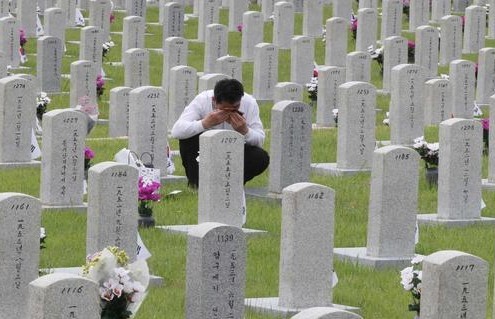A few days ago, as I read Tom King’s story about former exchange student Julie (Yuliia) Tryukhan and her two children fleeing war-torn Ukraine, I thought of that long-ago warning to the world, “War is hell.”
In preparation for Memorial Day, in reviewing Tennessee sports connections to the military, those three words flashed up again in my old mind. I do believe war is one version of hell on earth. I am not a pacifist. We do what we think we have to do. We almost always believe we are right. There is a price.
A Powell High classmate, Charles Nix, big blond right guard with broad shoulders and an “aw shucks” personality like Lil’ Abner, died on a shot-up hillside in Korea on 22 September 1952. He had been on the job 38 days, fighting a hoard of invaders on behalf of South Koreans about to be overrun.
It was a thankless fight in an awkward place under difficult conditions. Many wondered what the heck we were doing there. It was expensive. The Pentagon finally decided there were 33,651 American “battle” deaths and 20,617 “others” who died of everything from Jeep wrecks to influenza to friendly fire.
Korea estimates some 5 million civilians and soldiers lost their lives during the three-year shootout. Many were killed for no apparent reason. There was no real ending, only a negotiated timeout.
Charles Nix was in a group of five, deployed near the village of Sinsan-ni, not far from Old Baldy and the Haean-myon valley in Yanggu county, Gangwon province.
Sarah and I went there after the Seoul Olympics. A Korean Army captain, fluent in English, understood my international press credentials and how personal was the mission. With official records, a map and a government car, he took us where Charles had gone in search of a sniper. There is no marker but we got the message.
A few of you may recognize that and these other stories as reruns. I have written them before. That is what Memorial Day is – remembering.
In Neyland Stadium are honored numbers of four Tennessee football players killed in Europe in World War II.
Bill Nowling, No. 32, three-year starting fullback and linebacker (1940-42) from St. Petersburg, helped win a Southeastern Conference championship. He finished with an interception against Tulsa in the Sugar Bowl.
In June 1943, after graduation, he was commissioned an infantry second lieutenant. In July, he married his high school sweetheart. A year and a few weeks later, he died leading his platoon in fighting in France – one day after his 24th birthday.
Number 62, Clyde “Ig” Fuson, from Middlesboro, played second to Nowling. He scored the knockout touchdown against Tulsa. He enlisted in the Army as his way of following his coach, Robert Reese Neyland. The 84th infantry division took Geilenkirchen, Germany, on Nov. 19, 1944, and moved on to Beeck and then Lindern. Ig was killed on Dec. 4. He was 21.
Willis Tucker, No. 61, homegrown, Knoxville High School, was a reserve center and guard on the 1939 team that went undefeated, untied and unscored-upon. He played behind Norbert Ackermann and Bob Suffridge on the 1940 team that finished fourth in the AP poll.
Willis had a kind heart. He made crutches by hand for the children’s hospital in Sevierville. He tried to keep it a secret but word leaked out. He was nicknamed “Crutch.”
Tucker was 26 when killed in the Hürtgen Forest on Nov. 28, 1944, the day the U.S. Ninth Army reached the Roer River in Germany.
Number 49 Rudy Klarer, fierce guard, fearless fireman during summer breaks, came from Louisville. Soon after the Sugar Bowl, he departed for officers’ training at Fort Benning.
He went to Germany as a second lieutenant. He became a platoon leader. He was killed in action on Feb. 6, 1945, 11 days after the official conclusion of the Battle of the Bulge. He was awarded a silver star “for bravery in protecting the lives of the men under his command.”
Robert Reese Neyland, their coach before that war, was on the other side of the world, supervising movement of Allied supplies across the Himalayan Mountains. That was late in his military career, after his engineering education at West Point, after service in France during World War I and canal duty in Panama. He had a key role in China, Burma and India.
Neyland left the Army in 1946 as a brigadier general. In the years between assignments and after all obligations were met, he produced a 173-31-12 football record for the Volunteers. It was not his idea that the stadium should have his name. Bronze statue? No way.
Names, faces and places change from generation to generation but the concept of conflict remains much the same. Wars have cost many lives. Many others were changed. One former Vol changed a war.
Austin Shofner played for Neyland, graduated in 1937 and joined the Marines. He was having a ball playing and coaching service football until the Japanese bombed Pearl Harbor.
Shofner joined the fray in defense of the Philippines. He was captured at Corregidor. He endured 11 months in prisoner camps.
On April 4, 1943, Shofner led the only successful escape from Japanese confinement. He and his men were first to tell the world about the atrocities being inflicted, including the Bataan Death March and brutal starvation, torture and death in POW camps.
The United States of America reacted with a more vigorous war effort. You know what happened to Japan.
Indeed, war is hell. So are murders in a Texas school room, in that Buffalo grocery store, in business lootings and even on sidewalks in broad daylight. Please stretch Memorial Day just a little and include the innocents in your prayers.
Marvin West welcomes reader comments or questions. His address is marvinwest75@gmail.com

